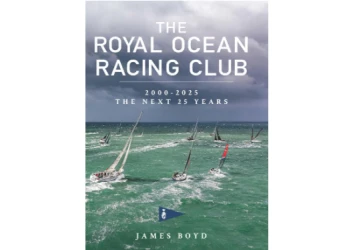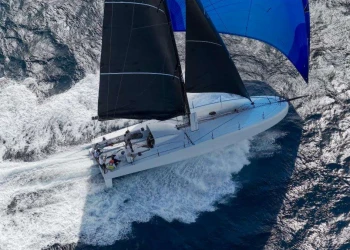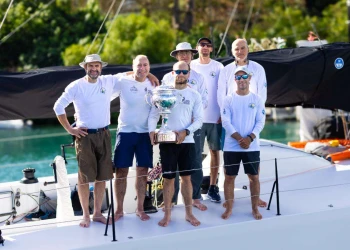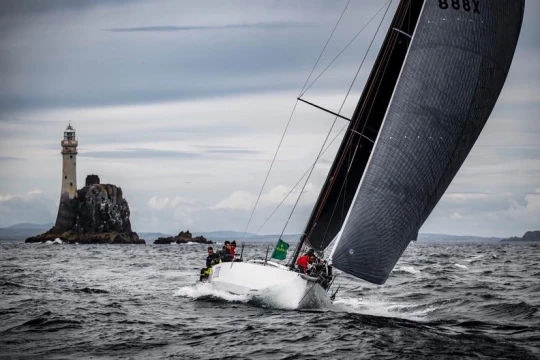
Gilles Fournier's J/133 is victorious in IRC One after a tightly contested battle against Thomas Kneen's JPK 1180 Sunrise III © Rolex/Kurt Arrigo
Fournier Fires Pintia to Victory in IRC one
Gilles Fournier and his family and friends on Pintia couldn't quite believe they had managed to win IRC One after such a close battle with Sunrise III. Having raced offshore regularly for the past half century and now 77 years old, Fournier hasn't yet decided whether or not this was his last Rolex Fastnet Race. Chances are he would miss the challenge and camaraderie, not just with his own crew but with the opposition too.
Pintia finished at 18:20:47, her corrected time just over 1 hours 20 minutes ahead of Sunrise III, with Ed Bell's Dawn Treader completing the IRC One podium. This is Pintia's second time topping the podium having won class in 2017.
Fournier met his rival skipper on the dock soon after they stepped ashore, victorious in Cherbourg. Tom Kneen, owner of the JPK 1180 which was overall winner of the Rolex Fastnet Race in 2021, is a formidable campaigner and one that Fournier never expected to beat on Pintia, a J/133.
Almost half Fournier's age, Kneen is a relative newcomer to the sport of offshore sailing, yet the softly-spoken Plymothian has a fierce approach to his racing and the Rolex Fastnet Race in particular. "This is going to take some adjustment to my thinking," said Kneen with a smile, having become so used to winning on a regular basis. "This is the first time since 2020 that I haven't won in class, but I couldn't be happier to lose to you and Pintia," he said to Fournier.
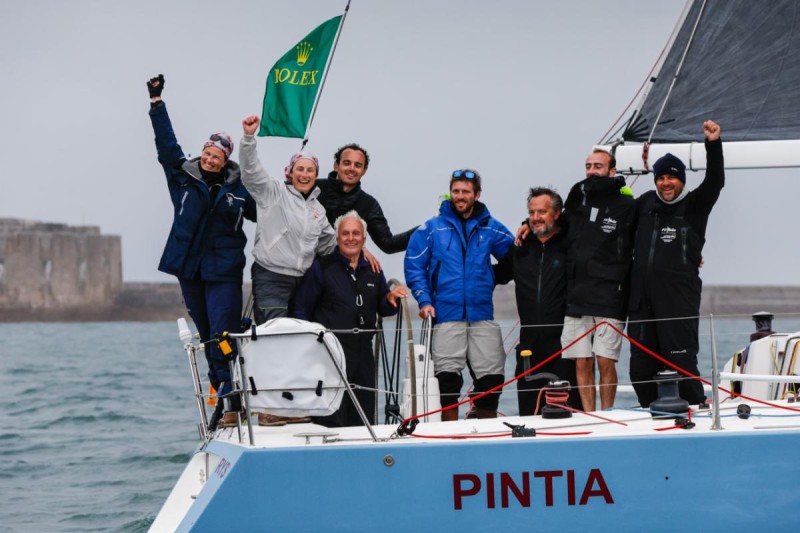
There is a lot of mutual respect between the top two finishers in IRC One. The two boats have very different sweet spots, with J/133's longer waterline length working well for her on the upwind but the lighter weight of the JPK 1180 making Sunrise a downwind planing weapon in the right conditions. The breezy, blustery final run-in to Cherbourg highlighted the differences starkly. "We took out five miles on Pintia in 20 minutes," said Kneen. "When the breeze was up and we're able to plane, Sunrise was doing 16 knots and Pintia was doing nine. If we'd have just had another 30 miles of race course I think we might have beaten them."
Fournier was pleasantly surprised, and perplexed, that Sunrise hadn't been able to disappear over the horizon since the downwind conditions that began with the Fastnet Rock rounding. "It's a mystery. We didn't expect to be able to stay anywhere close to you," he said to Kneen. "What happened to you?" Kneen smiled wryly as he replied: "I'll tell you over a beer." Maybe some missed opportunities on the race course. Kneen will need some time to lick his wounds. Certainly Sunrise felt they had sailed a longer distance than they had needed to. Their secret weapon, the six-metre carbon spinnaker pole had been designed to plug a gap in their armoury, to make the boat faster in VMG conditions downwind in less than 14 knots of breeze. Combined with a new set of flat gennakers, the spinnaker pole had been deployed on the run back across the Celtic Sea from the Fastnet Rock and Kneen declared himself happy with the experiment. However, choosing sides of the Traffic Separation Scheme around the Isles of Scilly might have been one of the key errors that put paid to Sunrise's hopes of a class victory. "Pintia came away from the Scillies at a hotter angle in more breeze," he admitted.
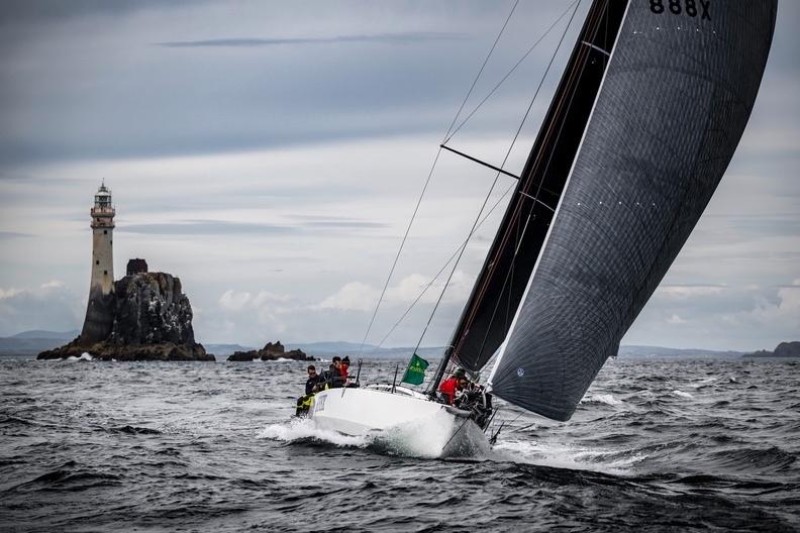
So after a close battle it's Fournier who celebrates with his crew which includes his daughter Corinne Migraine and her son Victor, the three generations coming together to form a winning team in one of the toughest races that this experienced skipper can recall. "I did the 1985 Fastnet and people talk about that one as one of the toughest. But I think there were times in this race when it was harder."
As to whether he'll be back to defend the title in two years ago, Fournier says with a smile: "I think my wife would like us to go cruising. This kind of sailing is not so much for her - doing 21 knots downwind with gennaker - although she is a very good sailor." Surely his wife could release him for five days or so in 2025 though? "These campaigns are not just about the race, they take at least six months of preparation and training. To do a race like the Rolex Fastnet Race takes a full commitment. And anyway, I don't know if my crew would want me back. I am not as effective as I was," he says modestly. It seems highly unlikely that the Pintia crew would attempt a Rolex Fastnet Race without their talismanic skipper though.
Fournier, by the way, is the French word for a worker who keeps the fires burning and the oven at high temperature. Even in the soggier conditions that greeted the fleet in rainy Cherbourg on Wednesday evening, Fournier was stoking the fire on Pintia all the way to the finish line, lighting up the J/133 just enough to eclipse Sunrise for a close-fought class victory. Few would bet against Fournier being back to defend his title in 2025.


